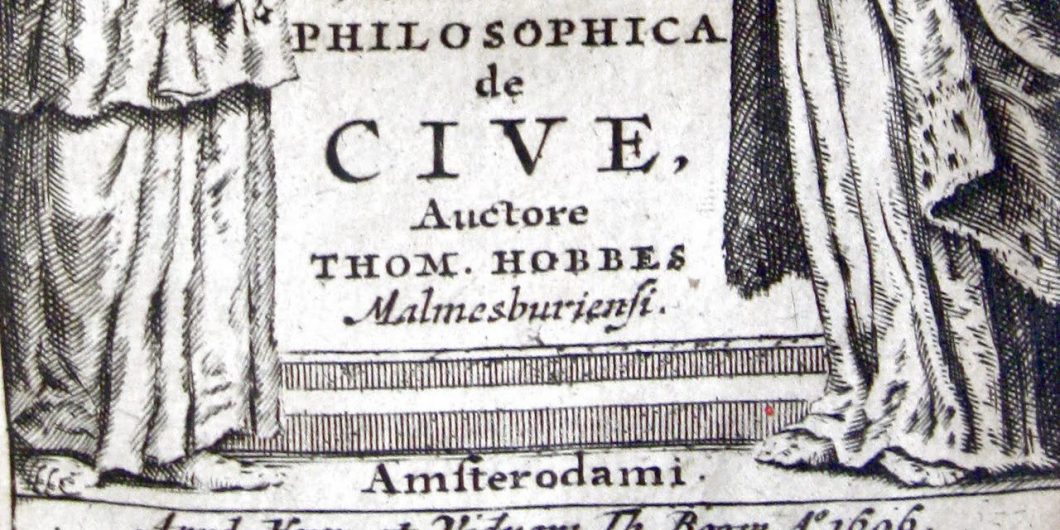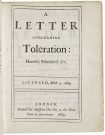What Would Hobbes Do?
Tracing the intellectual influence of major thinkers upon subsequent political history is more than a mere parlor game. And it is more than a question of whom to blame. To understand the pedigree of ideas is to understand our world and even ourselves. Now several millennia into the history of Western Civilization the bloodline is so convoluted that finding one ancestor of particular influence could seem a fool’s errand.
Nevertheless, as one sees recurring noses and eyes in a family photo-album, so too do we see especially strong features in some generations. For instance, a young man can look strikingly like the great-grandfather he never met. Although tracing such lineages is not the foremost intention of the book, Devin Stauffer’s Hobbes’s Kingdom of Light, is a timely reminder of the influence of Hobbes’s ideas upon the modern world.
Do we live in the world Hobbes made? Again, it would be too much to say that his influence dominates over that of, say, Locke, Montesquieu, Kant, Nietzsche, or any other great figures of the modern world. Certainly, the institutions of this country owe far more to others. And yet, were Hobbes to have engaged in wish-fulfillment, would his dreams look far different from how we live now?
Consider the increased centralization of political power, whether here in the United States, the European Union, or, in its extreme form, the People’s Republic of China. The public explanation for this process tends to be put in a manner familiar to Hobbes, namely: peace, stability, efficiency or the latest way of describing “commodious living.” Hobbes’s extreme nominalism is also increasingly our own. What were once thought to be permanent features of the human world, features that pre-existed politics or existed independently of it, are now subject to the fiat of the sovereign state.
Our abortion debates, ably limned by my colleague elsewhere on this site, have reduced one side to euphemisms such as “embryonic pulsing” where presumably “heartbeat” is considered too much of a concession to reality. And both sides put their hopes in the shifting makeup of “the least dangerous branch” of government. In his Elements of Law, Hobbes imagined the case of a deformed birth and argued that the question of its humanity “shall not be decided by Aristotle, or the philosophers, . . . but by the state.” In other words, all is proceeding exactly as Hobbes foresaw.
Stauffer’s book is a work of significant scholarship and close reading, a highly academic and serious project. Yet the guiding impulse is to respond to a political world that is deeply conflicted. As he writes in his introduction, “This puzzling predicament of continued success combined with lingering discontent gives us reason to go back to the origins of the modern development.” The problem is that we seem at once deeply satisfied with the modern world and dissatisfied with it. Each day brings us news of despair in the face of abundance and anger in a condition of peace. This is certainly not what Hobbes would have predicted.
Although a scholar of political philosophy who is interested in uncovering Hobbes’s thoughts on politics, Stauffer does readers the great service of ranging beyond the overtly political parts of his works to engage with larger, more theoretical topics. For instance, he ends the first chapter with a study of the problem of Hobbes’s materialism. Following Strauss, Stauffer adopts the distinction between a “metaphysical materialist,” which Hobbes wanted to be but could not, and a “methodical materialist,” which he had to content himself with being. A metaphysical materialist can prove that there is nothing beyond mere matter in motion, while a methodical one will proceed as if that were the case even if it is not proven. As Stauffer puts it, “Hobbes presents a materialistic conception of nature, and proceeds on its basis, without claiming to know whether nature itself truly conforms to that conception.”
Hobbes’s methodical materialism is very contemporary, and for two reasons. First, the effort to prove that there is nothing but matter is, in a way, impossible. Unless it can be demonstrated that our thoughts and arguments are, themselves, material of some sort or another the effort of making an argument refutes itself. Second, our human and social sciences are adamantly materialistic and yet unequalled in their commitment to rights, freedoms, and the will, in other words, moral concepts that can have no place in a materialistic universe, even with the most active swerve here and there. At least Hobbes was more consistent than his descendants.
The central chapters of the book are devoted to the question of Hobbes’s work on religion. These three chapters are not so much an exploration of what Hobbes believed in his heart, but what he wrote about both religion in general and Christianity in particular. They form the heart of the book and will be the major contribution of this volume for professional Hobbes scholars. For others, these chapters provide insight into the discontent that inspired Stauffer’s investigation.
One striking feature of Stauffer’s exhaustive investigation is that it reveals just how derivative Hobbes’s arguments are, even as they are presented as wholly new. As he explains, “Hobbes’s natural theology, as we saw, does not seek to discover or articulate the true nature of God; it moves in the other direction, conveying a lesson about the implications of God’s incomprehensibility and, more simply and deeply, about the limits of human knowledge.” That is all to the good, but the via negativa does pre-date Hobbes by two millennia. Elsewhere, Stauffer suggests that Hobbes masterfully developed “the difficulty of comprehending the justice of an omnipotent God who punishes men eternally for sins that he allows or even compels them to commit.” Again, Hobbes did not invent theodicy.
There are two essential locations of Hobbes’s critique of religion: chapter 46, the final chapter of Leviathan, and an appendix to the Latin edition, which is a line-by-line analysis of the Nicene Creed. The differences are instructive. The appendix reveals a deep knowledge of the arguments against the Christian faith and a knowledge of major and even minor heresies. Chapter 46 reveals how unnecessary that knowledge is to Hobbes’s project. His argument is twofold, namely, that an immaterial soul is impossible and all the doctrines of the Church are political power plays. These are, of course, related. Only a soul that could be punished in the afterlife is interested in the Sacraments. But that relationship is also a weakness. We have already seen that his materialism can go only so far in demonstrating itself. I would suggest Stauffer accepts or at least does not push back against Hobbes’s claims that he resolved substantial problems. Indeed, Hobbes’s influence is all the more fascinating for not so much proving his claims as disposing his readers to fall in with them.
Hobbes was a rhetorical master and one of the most vivid writers in the history of philosophy. Yet, as with his materialism, his arguments were often more methodical than philosophical. Quentin Skinner gets to the point in his description of a uniquely English mode of philosophy, namely, presenting all previous history as “…a sequence of more or less ludicrous misconceptions finally unmasked by [an] unanswerable blend of civilized satire and unimpeachable rationality” (Reason and Rhetoric in the Philosophy of Hobbes). He identifies this tradition as starting with Hobbes, and it is on full display in these chapters. It is also on full display in our present day.
Thirty-five years ago Richard John Neuhaus lamented America’s naked public square, and the stripping of the altars of our public discourse has only continued. Theological arguments have no purchase today, but neither do metaphysical arguments. Claims about entes rationis, such as the very ideas that might appear in a public square, will be dismissed as quickly and with the same Hobbesian impatience. Characterizing something as “metaphysical” is now a conversation stopper. One might as well believe in fairies.
Thomas Hobbes might not have bequeathed institutions to us but he did pass along a manner of being in the world. Not only have modern people developed an allergy to theological and metaphysical arguments, they have become excessively prickly. Whenever Hobbes entered Court, Charles II was reported to have said, “Here comes the Bear to be baited.” That could be the motto of social media. There are real implications to this. As Bertrand de Jouvenel explained in On Sovereignty, “Every time that man in society takes on Hobbesian characteristics, the irresistible force of logic makes Hobbesian solutions inevitable.” One of the foremost proponents of Hobbesian solutions, Carl Schmitt, captured the idea almost a century ago: “The political is the most intense and extreme antagonism, and every concrete antagonism becomes that much more political the closer it approaches the most extreme point, that of the friend-enemy grouping.” This goes well beyond Twitter. Where one stands on the recent controversy between David French and Sohrab Ahmari depends on how far along this process you think we are. Academic critics of the liberal order such as Patrick Deneen and Adrian Vermeule think we are very far along, indeed.
Stauffer turns to a different failure of the Hobbesian project, not political antagonism, but personal anxiety. He does not go into details, but the opioid crisis, suicides, mass shootings, and any other list of social and personal pathologies might easily provide evidence. He concludes his book with a brief consideration of “the shallow, frenzied ways in which modern men try to distract themselves from their own dissatisfaction.” But whence comes this dissatisfaction? His guide at the end of the book is Nietzsche, who can get you only so far. According to Stauffer, “the modern Hobbesian state, in telling us that we can and should be satisfied with the security, freedom, and prosperity attainable in this world, tells us something about ourselves that is not true.”
“What is truth?” Francis Bacon thought Pilate’s question was in jest. In anything beyond the right ordering of words, Hobbes would have agreed. Yet the truncated understanding of the world and ourselves that Hobbes’s methodical materialism imposes upon us is inseparable from the discontent felt by so many in this world of peace and plenty.
Stauffer concludes that Hobbes’s mistake was to combine philosophy and politics in such a way that our political communities ask too little of us and we ask too much of reason. Rousseau would have agreed, but his solution is hardly encouraging. I would suggest, by contrast, we ask too little of reason. Hobbes cut us off from a rational account of meaning and transcendence, extending Machiavelli’s anti-theological ire to metaphysics. Stauffer’s fine book stumbles only by not considering that Hobbes was wrong to do so.



